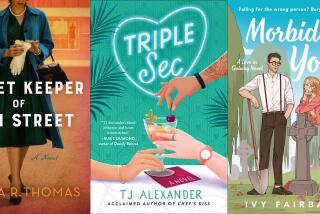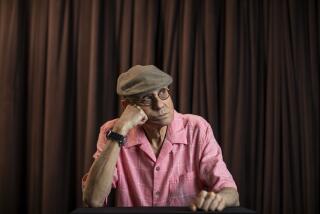It could be titled ‘The Chef Who Loved Me’
- Share via
When Dick Francis emerged from self-imposed retirement last year with “Under Orders,” one of his better novels, he acknowledged the assistance of his son, Felix. Too bad he waited to make that collaboration official. Instead, father and son share their first byline on “Dead Heat,” a swiftly paced but considerably less satisfying tale that, surprisingly, has more to do with catering than cantering.
Max Moreton, the thriller’s narrator-protagonist, is the very British young chef-restaurateur who elected not to follow in the stirrups of his late father, a steeplechase jockey. “As far as I was concerned,” he tells us, “both ends of a horse were dangerous and the middle was uncomfortable.” Instead, Max’s muse has led him into the kitchen of his own popular Newmarket restaurant, the Hay Net, from which, thanks to a friendly entrepreneur, he is about to move onto the culinary fast track with an upper-class eatery in London. But, as is the way of crime thrillers, all does not go smoothly.
When first we meet Max he’s suffering the physical discomfort of food poisoning and fretting about the hit his reputation will take once the news spreads that the black-tie dinner he catered for the racing elite made nearly everyone ill. Worse yet, he discovers that the public health officials have shuttered the Hay Net in a noisy, well-publicized manner.
Before he can deal with that, Max has to put together a luncheon for 40 at the track’s private boxes, hosted by an American company located in Wisconsin. This time, the main course is eminently edible; the problem comes with the dessert, a bomb that destroys a section of the building, wounding Max and killing several diners as well as a beloved member of his staff.
For roughly the first third of the novel, the calamitous events and Max’s reactions to them suggest that we’re in for an exceptional entry in the Francis canon. Then, the story stumbles. The authors introduce a romance between Max and Caroline Aston, a beautiful young viola player with the Royal Philharmonic, who, having been poisoned by his food, is suing him for damages and loss of income.
Over a meet-cute dinner at the Restaurant Gordon Ramsay (whose famously anger-unmanaged chef is thanked on the novel’s dedication page), the young couple engage in frothy banter. “Isn’t music described as food for the soul?” Max asks. “The quote is actually about passion,” Caroline says. “ ‘There’s sure no passion in the human soul, but finds its food in music.’ ”
It’s good that they cleared up that point without having to resort to Bartlett’s, and it’s nice that Max has a potential girlfriend, but one would think he had other, more demanding fish to fry: a poisoning, probably not accidental, and a decidedly nonaccidental bombing with several fatalities. And there’s the need to reopen the Hay Net and reestablish his rep. But love will have its way, evidently, even if a light and surprisingly sexy (for Francis père, at least) romance doesn’t exactly meld with murder and mayhem.
What follows are a series of hairsbreadth escapes -- from a car without brakes, from a burning house, from thugs with guns -- interspersed with romantic idylls, orchestrated by viola. One takes place when Caroline is on tour. Love-struck, Max feels compelled to fly to Chicago to see her. Wait a minute! Isn’t Chicago within driving distance to the host company of that fatal dinner at Newmarket?
While Caroline makes beautiful music, Max visits Wisconsin and, after dodging another attack on his life, comes away with the identity of the villainous mastermind behind the poisoning and bombing.
That kind of convenient coincidence edges credibility into the rails.
Then there’s the durability of a hero who, though a mere culinary master, is able to take more physical abuse than James Bond on a bad day and, like Bond, still find time and temperament to bill and coo.
In the past, Francis has given us a number of excellent contemporary thrillers. This time we’ll have to settle for a strangely old-style ripping yarn that, while action-packed and mildly entertaining, doesn’t bear a great deal of scrutiny.
--
Dick Lochte is author of the comedy-thriller “Croaked!”
More to Read
Sign up for our Book Club newsletter
Get the latest news, events and more from the Los Angeles Times Book Club, and help us get L.A. reading and talking.
You may occasionally receive promotional content from the Los Angeles Times.






